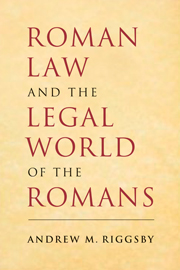Book contents
- Frontmatter
- Contents
- ROMAN LAW AND THE LEGAL WORLD OF THE ROMANS
- 1 Introduction
- 2 Roman History – The Brief Version
- 3 Sources of Roman Law
- 4 Sources for Roman Law
- 5 The Legal Professions
- 6 Legal Education
- 7 Social Control
- 8 Legal (In)equality
- 9 Writing and the Law
- 10 Status
- 11 Civil Procedure
- 12 Contracts
- 13 Ownership and Possession
- 14 Other Rights over Property
- 15 Inheritance
- 16 Women and Property
- 17 Family Law
- 18 Delict
- 19 Crimes and Punishments
- 20 Religious Law
- 21 Law in the Provinces
- 22 Conclusion
- Documents
- Glossary
- Further Reading
- Index
11 - Civil Procedure
Published online by Cambridge University Press: 05 June 2012
- Frontmatter
- Contents
- ROMAN LAW AND THE LEGAL WORLD OF THE ROMANS
- 1 Introduction
- 2 Roman History – The Brief Version
- 3 Sources of Roman Law
- 4 Sources for Roman Law
- 5 The Legal Professions
- 6 Legal Education
- 7 Social Control
- 8 Legal (In)equality
- 9 Writing and the Law
- 10 Status
- 11 Civil Procedure
- 12 Contracts
- 13 Ownership and Possession
- 14 Other Rights over Property
- 15 Inheritance
- 16 Women and Property
- 17 Family Law
- 18 Delict
- 19 Crimes and Punishments
- 20 Religious Law
- 21 Law in the Provinces
- 22 Conclusion
- Documents
- Glossary
- Further Reading
- Index
Summary
If someone says the word “law” to you, the first things likely to come to your mind will include “courts” and “trials.” Arguably, that is a distorting view, and the law has its greatest effect less directly – when people know how to follow the rules on their own without direct enforcement or judgment, as in a game of pick-up football. Still, even that situation probably could not exist without at least the possibility of formal trials, and courts are one of the most distinctive features of what we would recognize as a “legal” system. This chapter will discuss the procedure in what we usually call Rome's “civil” courts (the actual Latin word is “private”), where the vast majority of cases were heard. Criminal (literally “public”) procedure will be treated in Chapter 19. I will begin by discussing the set of rules used during most of our period: the so-called formulary procedure. Then I will treat more briefly its predecessor (the legis actiones) and a partial successor (called cognitio).
While this chapter is about procedural rules, not the substantive law discussed in most of the rest of this book, I should make one substantive point here. Since the civil and criminal courts operated under very different rules, I need to give a very brief description of the different jurisdictions here.
- Type
- Chapter
- Information
- Roman Law and the Legal World of the Romans , pp. 111 - 120Publisher: Cambridge University PressPrint publication year: 2010



